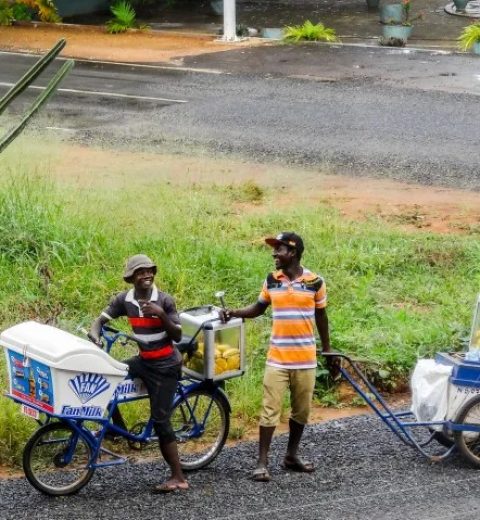14 things people don’t really tell you about when it comes to moving to Ghana!
You’ve heard the pitch: “You will love it, it’s so nice! I’m settled in my big house with my gates, my job is great, and the kids are thriving.”
It’s all true, but those of us on the ground know that life here comes with its own unique set of beautiful, frustrating, and often hilarious realities.
Beyond the obvious truth that money is king, here are 14 things you should really know if you’re considering making Ghana your permanent home:
1. The Secret Language Barrier: More Than Just English
Yes, English is the official language, but trying to navigate a market or have a deep chat with the local tailor using only standard English is a crash course in frustration. While many in the diaspora understand basic Twi (beyond “Akwaaba” and “Ɛte sɛn”), the gap between understanding and speaking fluently is a canyon.
Tip: Forget the expensive apps. Tune into local Twi radio stations and immerse yourself. Don’t be shy about trying to speak it; Ghanaians will genuinely appreciate the effort, even if you butcher the tones (and you will).
2. Your Stomach Will File for Divorce (The Food Adjustment)
When you visit on holiday, a bit of Waakye or Kenkey is a treat. When you live here, suddenly your digestive system is confronting large quantities of pepper, fresh palm oil, and heavy starches like yam and green banana every day. This is an adjustment, even for seasoned eaters.
Tip: Start your food detox with fresh fruit. Ghana’s fruit is incredible and helps digestion. Save the Kenkey and Banku for special occasions until your internal system officially submits its new paperwork.
3. The Silent Killers: The Ghanaian Cultural Shock Signals
Ghanaian politeness is a beautiful thing, but it’s a double-edged sword. You will hear, “Oh, it’s okay, don’t worry,” when you’ve clearly done something wrong or inappropriate. When you hear “don’t worry,” you should start worrying. That’s the Ghanaian code for, “I’m being polite, but you messed up.”
Tip: When frustrated, always be polite and use soft language. A confrontational or rude approach guarantees your issue will be solved slowly and with unnecessary, subtle problems. Remember, there’s always a way, but only if you ask nicely.
4. Security: It’s Not a Movie, It’s Just Life
Ghana is safe, but it’s a normal country, not a protected resort. You wouldn’t walk around late at night flashing an iPhone 15 in certain parts of London or New York, so don’t do it in Madina or any neighborhood late at night. The risk here is less about violent crime and more about opportunistic theft.
Tip: Be generally cautious and aware, just like anywhere else in the world. A smile doesn’t mean trust; it just means you’re in Ghana.
5. The Invisible Enemy: Malaria and Dengue
Your body is not used to Ghanaian mosquitoes. Complacency about taking anti-malarials or using repellant can lead to a quick and unpleasant introduction to Ghanaian healthcare. Mosquitoes love new blood, and they will find you.
Tip: Do not skip the prophylaxis, especially in the first year. When out late, wear “long trousers” (trousers/pants) and light long-sleeve shirts. It’s not a fashion fail; it’s a life choice.
6. The Soundscape: Noise Pollution is a Feature, Not a Bug
That loud music, the constant traffic horns, the church megaphone at 5 AM—on holiday, you shrug it off. When you live here, it becomes your soundtrack. Remember, a car horn isn’t always a warning; sometimes it’s a taxi driver saying, “Hey, you need a ride?”
Tip: Make visiting the local market a part of your adjustment. It’s a masterclass in organized chaos. You will gradually start tuning your ears to the different calls and learning how to interpret the constant noise.
7. Infrastructure Challenges: Your First-World Problems Don’t Exist
The roads might be bad, public transport unreliable, and the utilities—well, let’s talk about the utilities later. Trying to apply your home country’s standards here will only lead to daily stress and frustration.
Tip: You are in Ghana. If everyone around you is complaining, it’s a national problem. If everyone around you has a “life hack” to deal with it (a water storage tank, an inverter, a preferred back route), copy the hack.
8. The Dress Code: Hwɛ (Look)
Ghana generally has a conservative dress code, particularly in traditional and rural areas. Avoid overly revealing clothing that will cause you to get that judgmental sound, the “tut,” and the comment: “hwɛ” (look). You will know when you hear it.
Tip: Keep a lightweight scarf or wrap with you. It’s a quick fix if you find yourself needing to cover up to show respect in a local setting or traditional event.
9. Cultural Expectations: Sir, Ma’am, and Shaking Hands
Greetings are incredibly important. You must shake hands and exchange pleasantries before getting down to business. If someone calls you “Sir” or “Ma’am,” they are being respectful and do not want to call you by your first name unless you explicitly tell them to.
Tip: Take a few extra seconds to genuinely ask, “How is your family?” The relational connection is more important than the transaction.
10. Homesickness: The Isolation Dip
Moving is a huge adjustment. It is perfectly normal to experience homesickness, confusion, or isolation, even if you are surrounded by family. Building a social network takes time.
Tip: Force yourself to get out and about! Check out the local event sections (like the one we have conveniently placed here for over 400 Ghana events!) or join a local group. There is always something happening that involves the diaspora and new residents.
11. Traffic: The Commute is a Time Warp
Traffic in Accra and Kumasi is chaotic, congested, and unpredictable. A journey that looks 20 minutes on the map can easily be 90 minutes in real life. Plan your commute by time, not distance.
Tip: Adopt the Ghanaian approach: use the traffic time for something else. Take calls, listen to a podcast, or mentally draft your next business plan. Patience is your most important travel accessory.
12. Dealing with Bureaucracy: The Endurance Test
Navigating government offices, utilities, and official paperwork in Ghana can be challenging. Expect long queues, multiple steps, and often unclear requirements.
Tip: Patience is not just a virtue; it’s a mandatory administrative skill. Bring a book, bring snacks, and never go without all your photocopied documents (and backups).
13. Corruption: Be Informed, But Be Firm
Corruption can be a reality when conducting certain businesses or interacting with specific low-level officials. While it’s a persistent challenge, being aware of it is the first step.
Tip: Have a clear, polite, and consistent policy. Stick to the law, and if you feel uncomfortable, politely request to speak to a supervisor or a higher authority.
14. Power Outages (Dumsor): The Inevitable Darkness
Power outages (dumsor) are still a common inconvenience. They can happen with little warning, and they can last for a few minutes or several hours.
Tip: Invest early. Your money is best spent on a reliable inverter system or generator. Don’t just adapt to life without electricity; invest in power to keep your home running.








